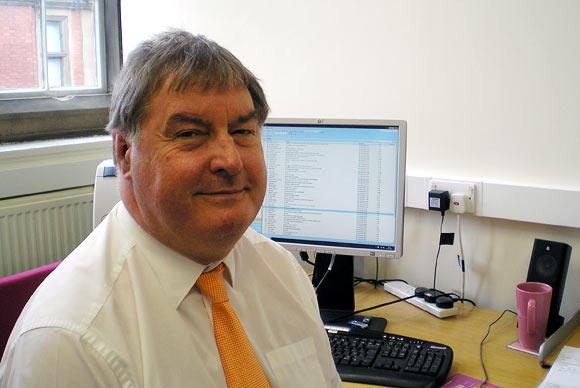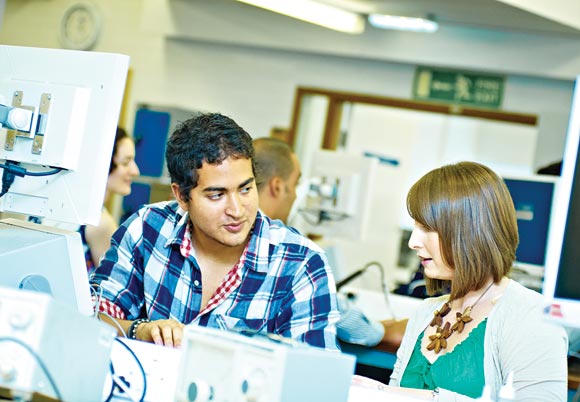 | « Back to article | Print this article |
Chem students, dream big: Margaret Thatcher was one!
Most international students struggle with basic mathematics, says Prof Mike Green, head of school, Newcastle University, UK.
There is one thing common between Margaret Thatcher and Prof Mike Green, head of school, Newcastle University, UK.
Prof Green was the second non-South African to receive an honorary doctorate in science from the University of Johannesburg, South Africa in 2004. Margaret Thatcher was the first.
A graduate in chemistry from King's College, London and PhD from Manchester University, Prof Green finds his inspiration in the British Prime Minister.
"Ms Thatcher is one of the few chemists who went on to become Britain's longest-serving PM. Doesn't that say enough why chemical engineers should see bigger dreams? Besides, chemists make good managers," says Prof Green, who spent a major part of his life in South Africa where he worked as a manager for SASOL, a global petrochemical company, managing a team of chemists and technicians.
Besides developing chemical research and technology, Prof Green devoted over two decades of his career towards finding opportunities to collaborate with South African universities to offer optimal education and training to students up to PhD level, thus establishing research collaborations with universities around the world.
He realises that lack of adequate laboratories and poor mathematic skills are major challenges confronting higher education in most countries.
"Most international students are poor in mathematics. Our aim is to create awareness among students about developing basic skills and improving the quality of international education for deserving students," states the professor, who has managed to increase the intake of students in both size and quality through improved research and undergraduate teaching since he took over the department at Newcastle in 2009.
Interestingly, among the 4,000 international students from 110 different countries studying at the university, over 214 are Indian students.
On his recent visit to India, Prof Mike Green spoke to Divya Nair about the scope of career for Indian students pursuing chemistry abroad, why international students must take mathematics more seriously at school and what each of them must do to make the most of their international exposure besides developing employability skills, given the economic recession.
'There is no industry in the world that does not hire chemical engineers or graduates'
You have been a professor and a professional. Can you tell us why do you see so much potential in chemical technology as a career option?
When I was a student, my chemistry professor gave us an assignment. He said he would reward that student who will discover one thing on earth that wasn't related to chemistry.
Over 30 years have passed by since that incident and I haven't come across a single element that is not chemical. That's the truth of chemistry as a science -- why it has evolved and will continue to (evolve) in the years to come.
What are the emerging jobs Indian students can consider after pursuing a course in chemistry?
There are over six million jobs globally available in the field of chemical technology today and chemical industry contributes to 25 per cent of the world GDP.
If you think that a chemical engineer or graduate will end up working in a research laboratory discovering new things, you may be 10 per cent right. In the UK alone, less than 30 per cent of students who pursue chemistry turn out to be chemists. The rest of them seek jobs in manufacturing units, finish higher education or pursue management.
Let's face the reality -- there is no industry in the world that does not hire chemical engineers or graduates.
From the food you eat, to the clothes you wear and the paper you read every day, there is a wee bit of chemistry involved in everything you do. It is for you to choose an industry where you want to prove your mettle.
For instance, you could use technology to develop weather-proof garments, or find ways to synthesise cereals to make interesting breakfast products for working citizens.
Given that India's strength is agriculture, you could be working in a food and beverage processing unit. With a degree in chemistry, you may even find employment in other manufacturing sectors like textile or apparel, lubricants, paints and dyes.
Also, with the growing influence of hygiene in people's lives, you can find a place in the pharmaceutical units.
'If you choose a good university, you need not stress about employment'
Which are the countries that are offering jobs to Indian chemical graduates?
The United Kingdom has the highest absorption rate for chemical engineers besides the United States, which also offers good employment opportunities post completion of the course. Among the emerging ones would be South Africa.
You have spent over 30 years working in South Africa and interacting with various education institutions and students. What were the challenges you identified that you think must be addressed immediately?
One of the major challenges affecting students the world over is the inability of educational institutes to provide adequate facilities for learning.
For instance, if you are an institute offering science or chemistry programmes to students, you must have a well-equipped laboratory.
Lack of good laboratories dissuades even students who have the slightest inclination to take up the subject in their home country. Those who are motivated look for opportunities abroad. Those who are not end up with a poor quality of education and subsequently poor jobs.
Another concern is that the majority of students struggle with their skills in mathematics. This is partly because mathematics is made an optional subject after high school.
Mathematics governs a large part of our lives, be it in science, technology or management. If you want to generate revenue for any organisation, you have to know how to calculate.
Our aim as educationists is to discover possibilities to encourage and network with more students to finish their higher education and help them find relevant employment.
When you talk of funding higher education, do you think the UK as a country will be able to provide enough scholarships to international students, given the current economic recession?
The economic downfall has certainly impacted the influx of funds, particularly for research programmes like PhD. But most of the good universities have collaborated with corporate organisations to offer internships and post-education employment.
One can look forward to joining institutions that have similar programmes. If you choose a good university and make the most of your education, you need not stress about employment.
What are the employability skills one can develop while studying abroad?
Students must focus on their interpersonal skills -- the ability to communicate your ideas coherently and to be able to contribute and function as a team is very important to most employers.
You also need to be flexible and adaptive to change, especially if you are looking for employment in an international location. That's where your international education helps.
'We like to admit students who take responsibility for what they do'
How does one choose a good international university?
A great way to do that is to draw up a list. Find out the institutes that the best brains in your chosen field of study went to. Find out which institutes your seniors in school went to.
Write to your seniors, talk to them or visit the Facebook pages of these schools and find out more about the quality of programmes offered there. Check the requirements of the said universities -- grades, entrance scores, recommendations etc.
Accessibility and resources follow next. Is the school situated in the city or has a campus that is huge, but far away from the city? What are they offering in terms of additional facilities -- recreation, exposure and linkages?
Get all relevant information about the university before you start your preparation.
If the university's expectations are slightly above your standards, you can still work towards it. But never settle for a university that is below your expectations.
What skills are you looking for in students who apply at Newcastle University?
We expect applicants to have a basic knowledge of the discipline they are applying for.
International students must display their willingness to learn and move to a new country. In the interview round, we also gauge the interpersonal and communication skills of the student to understand how well s/he will fit into the school environment.
If you have travelled to various places, do not forget to mention this in your essay and interview. Students who have travelled stand a better chance as compared to those who haven't, because we believe that those who travel are comfortable adjusting to a new environment and will have interesting experiences to share.
If you have learnt a foreign language besides English, we would consider that as valuable too.
We like to admit students who take responsibility for what they do. Participation is one thing, being responsible is another. If you have volunteered for a cause, or been responsible for an event at school or college, highlight it in your application.
'Most international students struggle to draft a good statement of purpose'
What are the common mistakes that international students make which force you to reject them?
I have observed that most international students struggle to draft a good statement of purpose. They mention the grades they scored, the awards they won and the places they visited. But they fail to highlight their skills or what they learnt.
Let me share with you a recent incident. I was going through the essay of an international student and he'd mentioned that he'd been to some country in the North. Later on, when we interviewed the student, we realised that he had been to the country to work for an orphanage. He had stayed there for a few months, interacted with kids and he came back a different person. Surprisingly, he had not mentioned anything about the orphanage or the kids in his essay. But, that's what we want to know about our students. That's precisely what you must write in your essays.
Your essay should read like a brief profile of your life -- what you learnt, what you achieved and what you want to do in your life.
Also, if you are not honest about your achievements and manipulate facts in your application letter, there is a fair chance of your being rejected at the interview level.
It is equally important that you research the programme you intend to pursue well, so that you are able to convince the panel that you are really interested in the programme and the university you have applied to.
Illustration: Dominic Xavier
'Safety assumes greater importance when you travel to a new country'
What career advice would you like to share with Indian students who want to study in the UK?
A common trend observed among students across the world is that they face pressure from society and are often influenced while taking career decisions.
It is very important that you are fully aware about the course contents and are not influenced by external factors while making a career choice. Read, research and interact with senior alumni friends before making a choice.
Choose a course that you will enjoy, rather than opting for something which was recommended to you by someone who barely knows your interests and strengths.
Also do evaluate what jobs you can apply for after pursuing the course. Analysing the job prospects is one of the easiest ways to find out whether you will be happy with the choice of your programme.
In your opinion, what are the activities international students must take up to ensure that they make the most of their international study trip?
Travelling to a new country is a great opportunity for you in many ways. It helps you gain exposure to a new culture, meet new people and gain some knowledge and experience.
If you are shy and introverted, this is the time to improve your communication skills. Talk to students from other countries, make new friends and share your knowledge.
Most international programmes offer flexible study timings and are designed to allow students adequate time to travel and pursue their interests.
Join a culture club or any activity club that interests you. Engage yourself in activities beside the academic projects. There will be ample time for you to pursue your interests, yet stay ahead in your preparation for exams. Take to the field. Learn at least one new sport that you haven't heard of or played in your country before.
You are spending a fortune on your international trip. Make the most of it. Come back to your home country with a renewed spirit and ensure that you have enough things to say about your international trip to your friends, family and future employers.
Following the recent attacks on Indian students in the UK, what advice would you like to give Indian students to stay safe?
Any attack must be condemned. But it would be unfair if one were to say that crimes are targeted at one community or one section of people in society.
Irrespective of the country you reside in, you have to take certain cautionary steps to ensure that you are safe. Safety assumes greater importance when you travel to a new country.
Do not carry expensive accessories or valuables like mobiles or jewellery while travelling outside campus -- anything that you think will attract the attention of miscreants.
Do not provoke or talk to strangers who make you uncomfortable.
And always travel in groups and avoid travelling alone late in the night.
Illustration: Dominic Xavier





